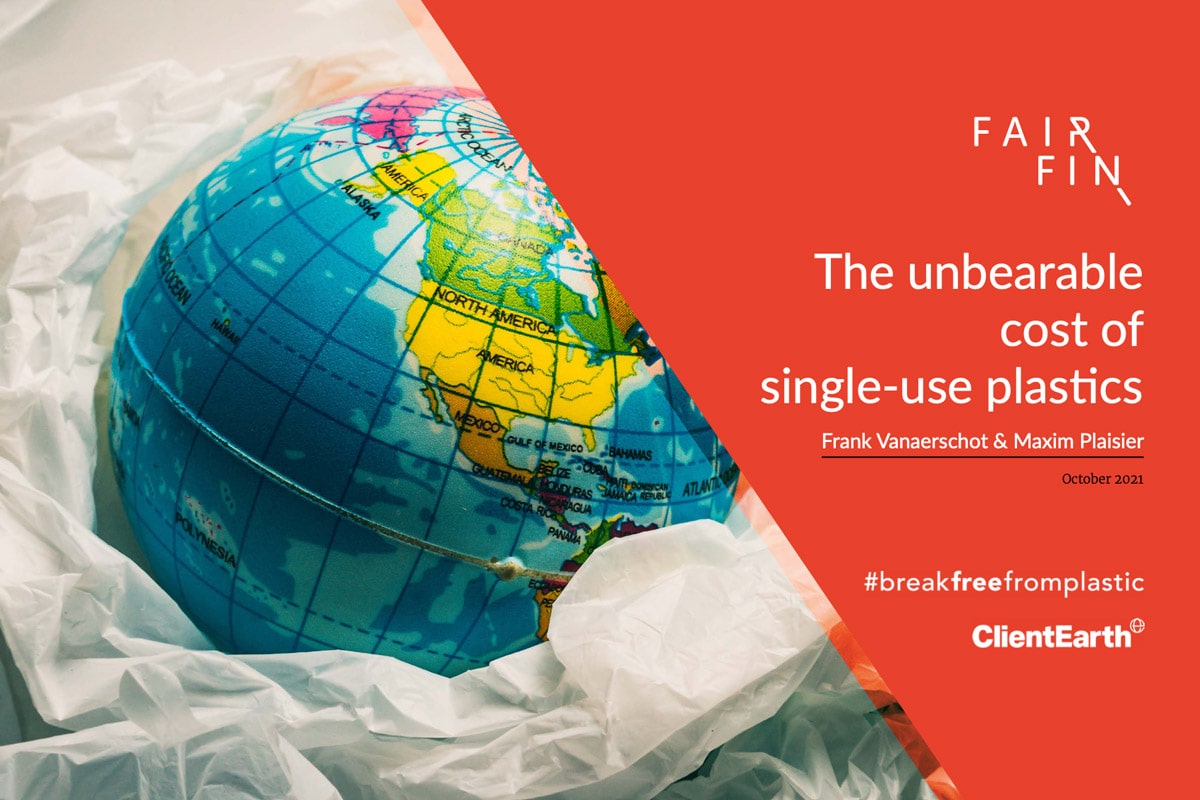The report was commissioned by environmental law charity ClientEarth. FairFin and ClientEarth ask banks to take off their blindfold and make their investments in the food industry dependent on a drastic reduction in the use of single-use plastics.
The production and use of single use plastics are not only bad for the planet and our health, they’re also a bad investment. According to scientists, the ecological damage caused by plastics is approaching a critical point where it is irreversible. As important as recycling is, to really tackle the problem we need to make and use less plastics. Companies in the food industry, such as AB InBev, Coca-Cola and Carrefour, are among the biggest users of single use plastics and are among the main culprits in the plastic crisis. But banks also bear a great responsibility. When financing companies, no bank studied in this report takes into account the impact of disposable plastic on our environment, health or financial system. "Anno 2021 it is disconcerting to see that banks are blind to their role in the plastics crisis," says Frank Vanaerschot of FairFin. "With recycled bank cards we will not get there. Banks in Belgium make the plastic mountain bigger every day, by investing tens of billions in the food industry without conditions.
Rosa Pritchard, plastics lawyer at ClientEarth, said: “Increasingly, citizens, scientists and policymakers are in agreement: the planet cannot handle any more plastic. Financial institutions like banks bear responsibility for this situation along with the companies they finance. They provide the financial oxygen that allows the food industry to breathe – and are currently doing so without taking into account its oversized contribution to the plastics crisis.”
FairFin's report examines the impact of plastics and exposes financial links between banks active in Belgium and 9 companies in the food industry, amounting to more than 78 billion euros since 2015. Deutsche Bank, BNP Paribas and ING stand out in particular. Frank Vanaerschot of FairFin points out the power banks have through their role as financiers: “of all the banks FairFin examined in this study, none has a concrete policy on plastics”.
There are also economic arguments for the banks to take off the plastic blindfold. Anyone who uses or invests in single use plastics is faced with a lot of additional costs. Recent regulations are becoming increasingly strict on the use of disposable plastics, which drives up the cost of plastic. Growing public awareness and lawsuits against large plastic polluters also have consequences for those who invest in the plastic mountain today. Finally, the sector is also struggling with overproduction. "The blind spot for plastic is not only bad for people and the environment, but also constitutes a risk for the banks themselves. It also puts their customers' money at risk", Vanaerschot emphasises.
Pritchard added: "Financial risks relating to plastics are snowballing. Banks are not immune to these risks, and need to engage with relevant companies on the subject – and fast, or risk opening themselves up to legal challenge.”
With this report, FairFin wants to put pressure on the banks to introduce an ambitious investment policy around the entire life cycle of plastic, and single use plastics in particular.
We specifically ask banks to draw up and apply an investment policy requiring companies to be transparent about their use of single use plastics and to set ambitious targets for reducing their use in all forms of financing and investment in the food industry.
We ask the federal government, as shareholders of BNP Paribas and Belfius, to take its responsibility to ensure that these banks soon adopt a policy that can serve as an example.
FairFin is an organisation that conducts research into the social and ecological impact of the financial system.
For questions, comments and interviews, please contact:
Frank Vanaerschot FairFin researcher
frank.vanaerschot@fairfin.be +32487 67 16 27
Amadeo Ghiotto FairFin researcher
amadeo.ghiotto@fairfin.be +32497 41 13 56




